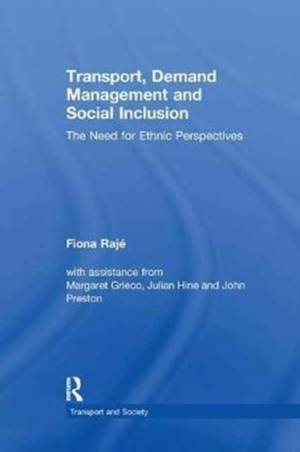
Door een staking bij bpost kan je online bestelling op dit moment iets langer onderweg zijn dan voorzien. Dringend iets nodig? Onze winkels ontvangen jou met open armen!
- Afhalen na 1 uur in een winkel met voorraad
- Gratis thuislevering in België vanaf € 30
- Ruim aanbod met 7 miljoen producten
Door een staking bij bpost kan je online bestelling op dit moment iets langer onderweg zijn dan voorzien. Dringend iets nodig? Onze winkels ontvangen jou met open armen!
- Afhalen na 1 uur in een winkel met voorraad
- Gratis thuislevering in België vanaf € 30
- Ruim aanbod met 7 miljoen producten
Zoeken
€ 102,45
+ 204 punten
Uitvoering
Omschrijving
Social inclusion/exclusion has only recently emerged in transport-related discourse. Despite the apparent absence of a transport policy framework for social inclusion/exclusion, there has been some movement towards a greater understanding of the social aspects of transport in the research sphere. This book brings together some of this research, focusing on ethnicity - an area that has, so far, had little discussion in the traditional transport literature, thereby contributing to the exploration of the interface between transport and social exclusion. In particular, it examines the contribution that demand management measures can make to the reduction of the negative impacts of road-based transport. It questions whether methods such as road user charging and work place parking can be used as instruments for social inclusion, and analyses the potential negative impacts of these schemes if sufficient attention is not paid to ethnicity issues.
Specificaties
Betrokkenen
- Auteur(s):
- Uitgeverij:
Inhoud
- Aantal bladzijden:
- 184
- Taal:
- Engels
- Reeks:
Eigenschappen
- Productcode (EAN):
- 9781138254855
- Verschijningsdatum:
- 6/03/2017
- Uitvoering:
- Paperback
- Formaat:
- Trade paperback (VS)
- Afmetingen:
- 156 mm x 234 mm
- Gewicht:
- 267 g

Alleen bij Standaard Boekhandel
+ 204 punten op je klantenkaart van Standaard Boekhandel
Beoordelingen
We publiceren alleen reviews die voldoen aan de voorwaarden voor reviews. Bekijk onze voorwaarden voor reviews.











